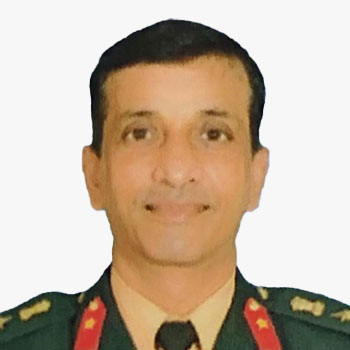DAY 2 / Wednesday, 12 June: Deep Dive Discussion
Track: Space Infrastructure & Situational Domain Awareness
Session Highlight
View RecordingPoints of Discussion
- Importance of international cooperation for space sustainability.
- Importance of tracking satellites and detecting potential threats.
- Geopolitical significance due to dense population and powerful nations
- India's potential to drive regional collaboration in space technology.
- Applications in monitoring borders, tracking military movements, and threat assessment.
- Space as a unique domain, sustainability of outer space.
AVM DV Khot
Principal Consultant
INSPACe
AVM Dhananjay Vasant Khot DV (Retd), commissioned in the Indian Air Force on June 11, 1988, is a distinguished pilot and Cat '1 Qualified Flying Instructor with over 3000 accident-free flying hours. He has held significant roles, including flight commander and squadron leader, contributing to high operational preparedness and performance in exercises. As a Joint Director at Air HQ and later Director of Personnel (Policy), he introduced impactful HR policies. Leading the Aircrew Examination Board, he enhanced testing processes and reduced accident rates. His efforts earned him commendations and the Vayu Sena Medal (Devotion to Duty) from the President of India. He is currently Principal Consultant, InSpace Ahmedabad.
Abhineet Jain
Director Sales & Business Development
BlackSky
Abhineet Jain, Heads the Sales & Business Development for Asia Pacific at Blacksky and is based in Singapore. Abhineet has been active in the Remote Sensing and Photogrammetry Industry for the last 28 years and has served various roles in technical, sales and business development. Before joining Blacksky, he was APAC lead for the Enterprise Global Business Development at Maxar. He has done his Post Graduate Research in the field of Climate Change and Forest Productivity from Indian Institute of Remote Sensing (IIRS), DehraDun, Department of Space, India. Forestry, Environment and Disaster Management are among his favourite areas where he has been promoting the use of Remote Sensing.
Aakash Parekh
Chief Commercial Officer
Pixxel Space Technologies
Aakash is Chief Commercial Officer at Pixxel, a space data company building the world's first commercial hyperspectral constellation. He heads the growth functions of the business including global sales, marketing and customer success. Aakash has set up programs to facilitate access to Pixxel's hyperspectral datasets and geospatial data platform to both government and commercial customers. Aakash has spent the past decade in frontier technology sales and is passionate about bringing breakthrough innovations to new markets. Prior to joining Pixxel, Aakash led business development in international markets for various startups in the AgTech and PropTech domains. Aakash has completed several courses in data science and remote sensing to supplement his business background and to ultimately bridge the knowledge gaps between commercial and engineering teams for his clients.
Srinibas Patnaik
Commercial Director, Asia Pacific Region
EarthDaily Analytics
Srinibas is an accomplished Business Professional with over 15 years of proven expertise in Enterprise IT and over 14 years in Geospatial industry.
Led companies across diverse businesses including brand-building, partner ecosystem, managing Strategic Accounts and ensuring engagement in Defence & Intelligence across Asia Pacific markets.
Srinibas is currently representing EarthDaily Analytics as the Commercial Director for Asia Pacific Region.
Srinibas holds MBA in Marketing Management and Bachelor in Electronics & Telecommunication Engineering.
Kapil Kumar Malik
Regional Sales Manager
Synspective
Dr. Kapil Malik is a seasoned expert in the remote sensing domain with over 18 years of experience. He currently leads sales and business development for Synspective Inc Japan in South Asia. Dr. Malik earned his Ph.D. from the Indian Institute of Technology (ISM) Dhanbad, specializing in PS-InSAR applications for urban deformation monitoring. Throughout his professional career, he has worked across government, academic research, defense, and private sectors, applying his expertise to a wide range of projects and initiatives.
Session Highlight
View RecordingPoints of Discussion
- Understanding SSA: Monitoring, tracking, and analyzing space objects
- Ground-based sensors and radars: Capabilities and limitations
- Benefits of combining satellite-based sensors with ground-based data
- Satellite-to-satellite SSA for enhanced precision and confidence in space navigation
- Impact of Space Weather on Space Assets
- The increasing reliance on space assets and the need for robust SSA systems
Gp Capt Ajay Lele
Deputy Director General
MP-IDSA
Group Captain Ajey Lele (Retd) was a Senior Fellow in the Manohar Parrikar Institute for Defence Studies and Analyses and headed its Centre on Strategic Technologies. He started his professional career as an officer in the Indian Air Force in 1987 and took early retirement from the service to pursue his academic interests. He has a Masters degree in Physics from Pune University, and Masters and MPhil degrees in Defence and Strategic Studies from Madras University. He has done his doctorate from the School of International Studies, Jawaharlal Nehru University (JNU), New Delhi. His specific areas of research include issues related to Weapons of Mass Destruction (WMD), Space Security and Strategic Technologies. He has contributed articles to various national and international journals, websites and newspapers. He has authored nine books and has also been an editor for seven books. He is a recipient of the K. Subrahmanyam Award (2013) which is conferred for outstanding contribution in the area of strategic and security studies.
AVM S Bhatnagar, VM, VSM
Air Vice Mshl Sanjay Bhatnagar VM VSM (Retd) commissioned into the IAF in the fighter stream in Dec 1983. He has been fully operational on MiG-27 aircraft on all its roles and has been a Qualified Flying Instructor. He has held various command and staff appointments. He is a Presidential award winner (VM Gallantry) during the Kargil operations in 1999. In his last rank as Air Vice Mshl, he has served as Air Defence Commander at HQ EAC, Shillong, Assistant Chief of Air Staff (Ops Offensive) at Air HQ and Assistant Chief of Integrated Defence Staff (Tech Int) at HQ IDS, holding appointments related to air defence, offensive air operations, space and ISR matters.
He superannuated in August 2020 and served as an Advisor to BEL and Consultant with CENJOWS.
R J Bhanderi
Scientist SF Space Applications Centre
ISRO
Shri R. J. Bhanderi, received his master degree in Physics from Sardar Patel University, Vallabh Vidyanagar (Gujarat) in the year 1990. He joined Space Applications Centre (SAC), Indian Space Research Organisation (ISRO) in 1991 and currently working as Scientist SF.
During his entire professional career he has been involved in applications of Remote Sensing and GIS technologies for Urban Planning and Natural Resources management.
His major contribution includes organization of national level GIS database and carry out integrated analysis in GIS. He has more than 30 years of experience in the field of GIS. Published more than 30 papers.
In recognition of his significant contribution in the field of GIS technology, he was awarded "Indian National Geospatial Award for the year - 2009" by Indian Society of Remote Sensing (ISRS).
Subhash Kumar
Regional Sales Manager
Trimble Advanced Positioning
A Surveyor by profession with a strong background of Geodesy & GNSS Data Processing and Analysis, Subhash Kumar has worked in the Survey of India in Geodetic & Research Branch primarily involved setting up the GNSS Data Centre and execution of various projects of National importance such as Setting up the GCP, Determination of Transformation Parameters between Everest and WGS-84 datum and carrying out observation and processing of GNSS Data to study Co-seismic & Post Seismic displacements after the Tsunami.
Since 2011 he is working with Trimble as Regional Sales Manager, Trimble Advance Positioning, handling Trimble Infrastructure products and Services. He has been the key resource in setting up the first CORS network in Bangladesh and now completed Survey of India CORS project on behalf on Trimble. Trimble has setup 523 CORS in India under the Prime Ministers SVAMITWA project.
Dr Anindya Bose
Senior Scientific Officer
The University of Burdwan
Dr Anindya BOSE is an academician turned entrepreneur working as Senior Scientific Officer in The Department of Physics, The University of Burdwan, West Bengal with R&D and teaching responsibilities for M Tech and M Sc in courses. He is alumnus of CSIR-NPL, New Delhi and International Space University (ISU), Strasbourg, France. He is recipient of URSI Young Scientist Award, Senior Member, URSI, Fellow, IETE and the current Chairman of IETE Burdwan Sub Centre. His research interest includes Global Navigation Satellite System (GNSS) and NavIC. He has experience with 14 sponsored R&D and Manpower Training Projects sponsored by Govt of India agencies (RCI-DRDO, DRDO, ISRO, AICTE, ITR-DRDO, SERB-DST, NGP-DST) with a financial support of more than Rs 2 crores. He leads the state-of-the-art GNSS Laboratory Burdwan (GLB) at Department of Physics, The University of Burdwan. He is the convenor of Industry-Institute partnership Cell (IIPC), a member of the IPR Cell, The University of Burdwan and a member of LITD22 Geospatial Sectional Committee and LITD22/Panel 5 for standardization of NavIC receivers of Bureau of Indian Standards (BIS). He is a member of WG 4.1.4 (Low Cost GNSS modules) of International Association of Geodesy (IAG). He has more than 150 publications in Journals, Conference Proceedings and holds 1 software copyright. He is a consultant to multiple Indian GNSS Industries and is the founder Director of a deep-technology startup company "NaviTro Consultancy and Services OPC Private Limited" working in the field of GNSS/ NavIC.
Session Highlight
View RecordingPoints of Discussion
- Importance of Maritime Security in the Indo-Pacific
- Technology and infrastructure needed for effective maritime domain awareness
- Impact of regional cooperation on smaller nations and their maritime security
- Role of advanced technologies (e.g., satellite surveillance, unmanned systems, AI) in maritime security
- Necessity for modernizing naval forces to keep up with emerging maritime threats
Cmde Sujeet Samaddar
SAMDeS
Cmde Sujeet Samaddar graduated from IIT Roorkee (B.E) in 1978. He began his career as an Engineer Trainee with Tata Consulting Engineers, Mumbai. Commissioned into the Indian Navy in 1980, Samaddar held various staff, four command appointments and retired in 2009 as Principal Director Naval Plans. He has been an International Fellow at the JIIA, Tokyo and Admiral RD Katari Fellow at the USI, New Delhi. He is an alumnus of the United Nations University, Tokyo, University of Madras, Chennai, DSSC, Wellington; CAWS, Secunderabad and NIDS, Tokyo. He has been the Directing Staff at DSSC Wellington and CNW, Mumbai. Post retirement he has served as Vice President Operations, NOVA Integrated Systems, a TATA Enterprise and Director and CEO of ShinMaywa Industries India Private Limited. Samaddar was Senior Consultant (Industry), NITI Aayog, Government of India until January 2019. He is presently Advisor at FICCI and Distinguished Fellow at the Center for Air Power Studies, New Delhi.
James McAden
Senior Director, Asia-Pacific Sales
HawkEye360
Prior to joining HawkEye 360 in 2020, Jamie had a thirty-year career as a U.S. Army Military Intelligence officer and Foreign Area Officer for Asia, retiring as a Colonel in 2020. In his military career, he held leadership and senior staff positions at U.S. INDOPACIFIC Command, at U.S. Embassies in the Asia-Pacific region, and at the Defense Intelligence Agency. In these roles he developed a reputation for building cohesive teams to tackle complex national security and intelligence issues in the region. He holds a Master of Arts in International Economics/Asian Studies from the School of Advanced International Studies-Johns Hopkins University, and a Bachelor of Arts in Political Science from Davidson College.
Rex Tan
Solutions Engineer
Capella Space
Rex is a Solutions Engineer at Capella Space, focusing on SAR satellite imagery solutions for the APAC region. With a strong background in GIS, remote sensing, and space technology, Rex has held key roles at Garuda Robotics, Esri Singapore, and Geotab, developing tailored solutions, driving regional business growth, and managing multi-partner projects. Rex holds a Bachelor's degree in Environmental Studies with a specialization in Geographic Information Systems (GIS) from the National University of Singapore.
Sarunisha Ramachandran
Product Lead
Suhora
Sarunisha R is with SUHORA as a Product Lead of SUHORA's next gen ISR product, with a foundation in Computer Science and Engineering and a Master's in Remote Sensing and GIS with specialization in Geoinformatics. With a deep passion for problem solving in the defence sector is dedicated to advancing defense strategies through spatial analysis and intelligence gathering, ensuring precision and effectiveness in critical operations contributing to shaping a more spatially-informed world.
Lt Gen Vinod Khandare, PVSM, AVSM, SM
Principal Advisor
Ministry of Defence
Lt Gen Vinod G. Khandare, PVSM, AVSM, SM (Retd) is currently serving as the Principal Adviser in the Ministry of Defence. He retired from active military service on 31 January 2018 and was the Military Advisor to the National Security Council Secretariat of India at the Secretary level from 2018 to 2021. In his final active military appointment, he served as both the Director General of the Defence Intelligence Agency and the Deputy Chief of Integrated Defence Staff for Intelligence from November 2015 to January 2018.






















